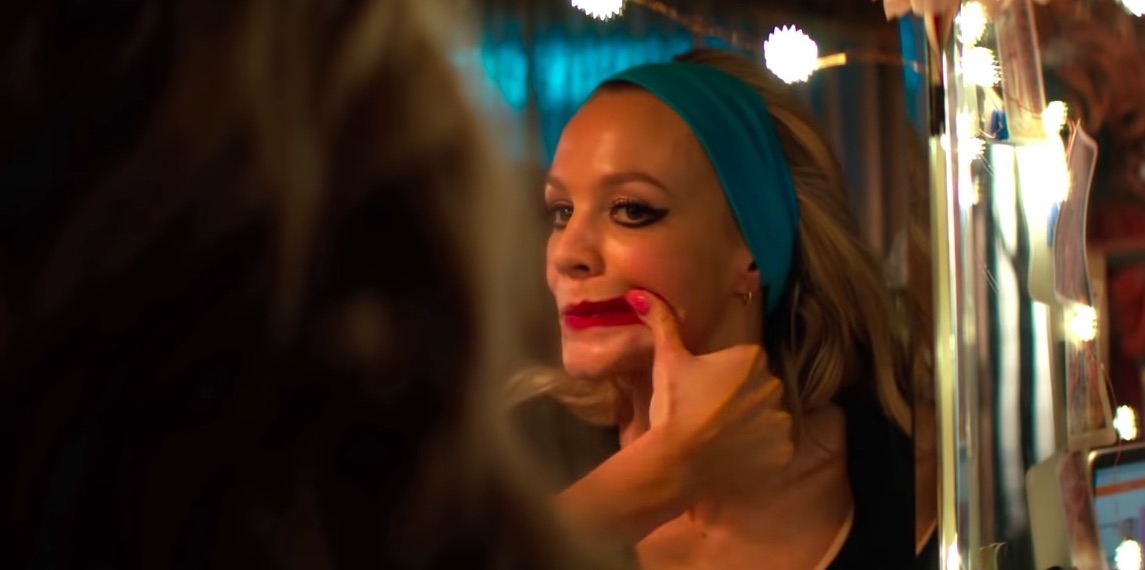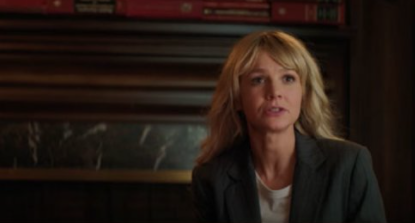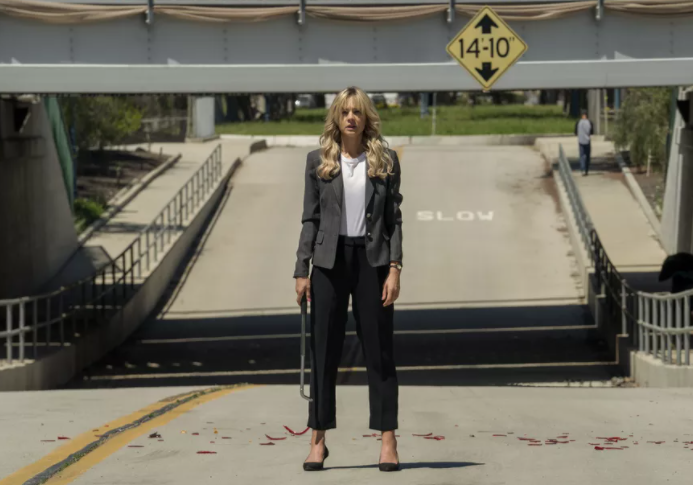by Lynn Lee

Warning: MAJOR SPOILERS for Promising Young Woman. Do not read until you've seen the film.
Can we all agree that Carey Mulligan IS Promising Young Woman? Not just that she’s sensational in it, though she is. No, I mean she is the movie: her performance as the tormented and tormenting protagonist, Cassie, is what holds it together and propels it to its gut-punch of a conclusion.
That’s not to shortchange PYW’s solid supporting cast or writer-director Emerald Fennell, who brings impressive confidence and panache to her feature debut and whose razor-sharp script gave Mulligan a perfect opportunity to shine. But what could have remained merely provocative on page really needed the right acting touch to sell the character’s complex blend of steeliness and vulnerability, wit and anguish, sexiness and inconspicuousness, icy calculation and seething rage, on screen. Luckily for Fennell, and for us, Mulligan convincingly conveys all aspects of this unlikely avenging angel and fuses them into a cohesive, if conflicted, whole.
Well, almost all aspects...

There is one that remains a head scratcher, though not through any fault of Mulligan’s. It’s Cassie’s weirdly symbiotic relationship with a character who remains, for all intents and purposes, a ghost.
If you went into Promising Young Woman having only seen its trailers, you might have reasonably assumed that Mulligan’s character was the victim of a sexual assault for which the perpetrator was never held accountable. Not so. The victim wasn’t Cassie but rather her best friend Nina, a fellow medical student whom she’d known since childhood. Why Fennell adopted this device isn’t entirely clear. It may be related to her more general goal—which she’s discussed in multiple interviews -- of subverting viewers’ expectations and desires for a simpler, more viscerally satisfying revenge fantasy in favor of the darker reality of the power dynamic between men and women. Or it may just be that certain turns of the plot would have been harder to engineer if Cassie had been the original victim. (As it is, some of those turns require some pretty hefty suspensions of disbelief.)
Whatever the reason for her existence, Nina becomes the most important character we never see in the movie, even though we don’t learn much about her beyond the bare-bones outline of the terrible things that happened to her: she got drunk and was raped at a party, she filed a complaint, the rapist got off scot free, and ultimately the distraught Nina committed suicide.
That’s a lot—enough to enrage any good friend. But it’s also all there is. Indeed, all that remains of Nina’s presence is the torch Cassie is still carrying for her. Even as Cassie wields this torch against the men and women who were complicit in her friend’s fate, she remains tight-lipped about Nina herself. Very late in the movie, in its most upsetting scene, Cassie finally unburdens herself—to Nina’s rapist—about what he took away from her:

Nina was extraordinary. So smart. Weirdly smart. She was so completely herself. Even when she was four years old. She was fully formed from day one. Same face, same walk. And funny. Like a grown up is funny, kind of shrewd. I was just in awe of her. I couldn’t believe she wanted to be my friend. She didn’t give a fuck what anyone thought apart from me, because she was just... Nina. And then she wasn’t. Suddenly she was something else. She was yours. It wasn't her name she heard when she was walking around. It was yours. Your name all around her. All over her, all the time. And it just... squeezed her out.
It’s a torrent of long-repressed cold fury, devastatingly delivered by Mulligan. Yet something about it doesn’t quite resonate as it should, because the audience still doesn’t really know Nina or anything about her except what she represented to Cassie. In a way, that may be the point: Nina got erased by everyone other than Cassie, who’s only been able to hold on to her by restructuring her own life around the horrible injustice that curtailed Nina’s.
One could even see Cassie’s arc as an extended channeling and absorption of her dead friend’s spirit—culminating in her erasing herself and finally becoming fully one with Nina in the film’s grim apotheosis. (There’s probably a bad alternate version of this story kicking around somewhere in which Nina turns out to be a hallucinated projection of Cassie’s trauma, but thankfully not in this version.)
However one slices it, Promising Young Woman’s elision of Nina – and Cassie’s desperate attempts to reverse it – present a particularly bleak take on the long-term effects of rape and a culture that won’t hold rapists accountable. It’s not wrong, even if it’s not the only or even the most appropriate possible response. Still, the film compounds the very problem it identifies by making the central victim a ghost or trope rather than a real character and turning its central character into yet another ghost. It’s troubling enough to have no answer to “Who was Nina?” other than “the victim” or “the motivator.” It’s even more troubling to have no answer to the question “Who was Cassie without Nina?” That most viewers probably won’t be troubled by this at all is a tribute to the power of Mulligan’s performance. But it doesn’t make the question go away.
